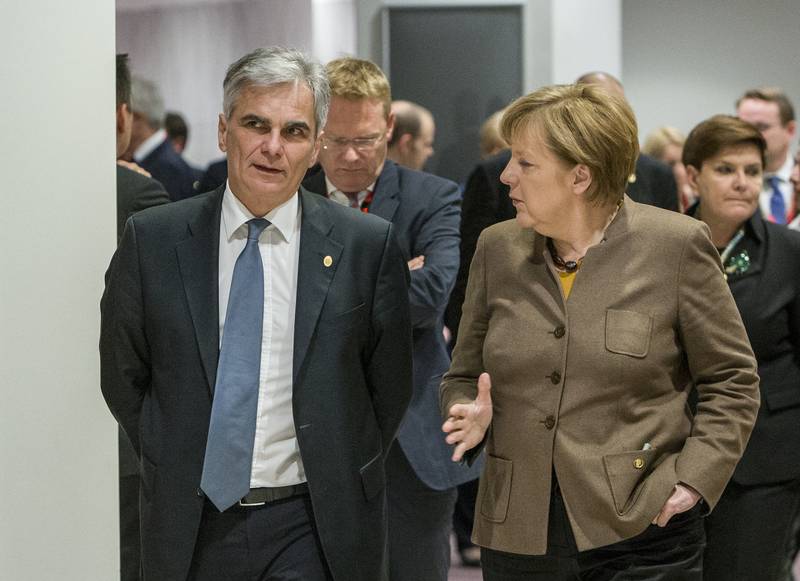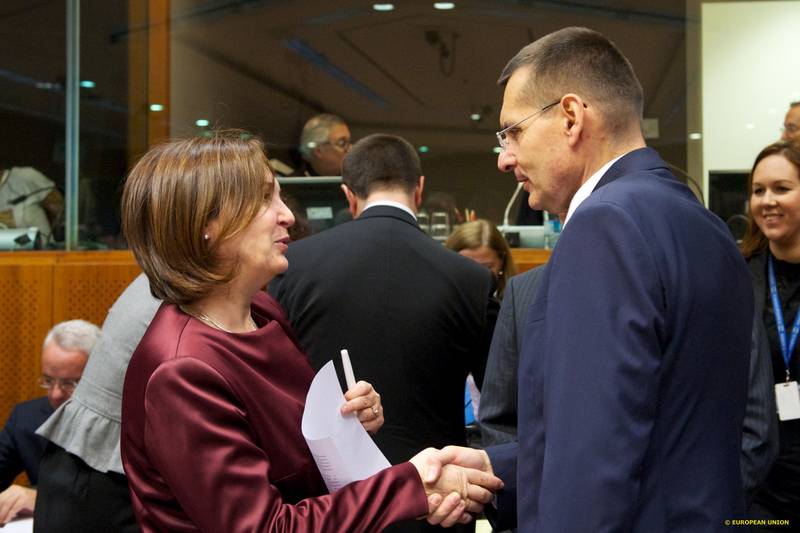A positive report in July would lead to a positive evalutation for Schengen
Adelina Marini, June 11, 2011
 The member states do not believe technical evaluations, it becomes clear after Bulgaria and Romania were tapped on their backs but again did not receive a date for accession to the Schengen area of security. In spite of the good technical preparedness, in spite of the invested efforts, the political decision about when the barriers for Bulgarian and Romanian citizens to be lifted will be again discussed in September. Please note - discussed, not taken. This has become clear after the first day of the Council of the internal ministers of the European Union on June 9, who discussed the Hungarian Presidency's proposal for conclusions on the matter.
The member states do not believe technical evaluations, it becomes clear after Bulgaria and Romania were tapped on their backs but again did not receive a date for accession to the Schengen area of security. In spite of the good technical preparedness, in spite of the invested efforts, the political decision about when the barriers for Bulgarian and Romanian citizens to be lifted will be again discussed in September. Please note - discussed, not taken. This has become clear after the first day of the Council of the internal ministers of the European Union on June 9, who discussed the Hungarian Presidency's proposal for conclusions on the matter.
Although two days earlier the Hungarian Minister of EU Affairs, Eniko Gyori,  said before the European Parliament that the draft conclusions would be a good news for everyone, the final version of the document contains precisely two sentences on the issue: "The Council adopted conclusions on the completion of the process of Schengen evaluation of the state of preparedness of Bulgaria and Romania to implement all provisions of the Schengen acquis. These conclusions underline that the Schengen evaluation process for Bulgaria and Romania has been finalized and that the Council will return to the issue as soon as possible, but no later than September 2011".
said before the European Parliament that the draft conclusions would be a good news for everyone, the final version of the document contains precisely two sentences on the issue: "The Council adopted conclusions on the completion of the process of Schengen evaluation of the state of preparedness of Bulgaria and Romania to implement all provisions of the Schengen acquis. These conclusions underline that the Schengen evaluation process for Bulgaria and Romania has been finalized and that the Council will return to the issue as soon as possible, but no later than September 2011".
 Asked by journalists on Thursday after the first part of the Justice and Home Affairs Council in Luxembourg, the Presidency, in the face of Hungarian Minister of Home Affairs Sandor Pinter, said that he could not say anything about the future, but stressed that the matter would be reviewed again by September 20th. It was possible, he added, by then a series of proposals to be made, including a step by step accession. This means that in a certain time frame the air, land and water borders could be opened. Mr Pinter explicitly noted, however, that transport by road and water would be opened at a later stage, without specifying what this meant.
Asked by journalists on Thursday after the first part of the Justice and Home Affairs Council in Luxembourg, the Presidency, in the face of Hungarian Minister of Home Affairs Sandor Pinter, said that he could not say anything about the future, but stressed that the matter would be reviewed again by September 20th. It was possible, he added, by then a series of proposals to be made, including a step by step accession. This means that in a certain time frame the air, land and water borders could be opened. Mr Pinter explicitly noted, however, that transport by road and water would be opened at a later stage, without specifying what this meant.
Home Affairs Commissioner Cecilia Malmstrom did not even mention the issue at the news conference in the first day of the Justice and Home Affairs Council. Instead, she was much more garrulous during the debates in the European Parliament on Tuesday on a resolution, adopted by MEPs on Wednesday.
The problem is in the trust
After explaining that there was no formal link between the Cooperation and  Verification Mechanism, with which Bulgaria joined as if with a probation in the European Union because of unresolved problems in this area, Cecilia Malmstrom added: "But of course we all know that access to Schengen is also based on trust. And trust or lack of trust has been very much debated the last weeks. So the decision to lift internal border control with Romania and Bulgaria must not only be based on the technical evaluation but also on this trust. And unfortunately that trust is not there today".
Verification Mechanism, with which Bulgaria joined as if with a probation in the European Union because of unresolved problems in this area, Cecilia Malmstrom added: "But of course we all know that access to Schengen is also based on trust. And trust or lack of trust has been very much debated the last weeks. So the decision to lift internal border control with Romania and Bulgaria must not only be based on the technical evaluation but also on this trust. And unfortunately that trust is not there today".
The thing that is obviously very hard to understand by the Bulgarian authorities is what actually the link between the Mechanism and Schengen accession means, even unofficially. Probably less people remember the case with the working out of the Mechanism that allowed Bulgaria and Romania join on January 1 2007, instead of being postponed for undefined time in the future. The government then failed to prove convincingly that it really fought corruption and organised crime, but the European Union had pledged too much of its own efforts and image to be able to afford the two former totalitarian countries to remain outside the Union. Then the opinion prevailed that it was better in, under the supervision of the Commission, than outside, creating unnecessary tension and spending in vain EU resources.
 Five years later, instead of Bulgaria proving that this trust will be justified, not only that no one is talking any more about lifting the Mechanism, but even it is clearly being linked to the membership in Schengen. The Schengen area is not a medal, with which self-loving politicians can decorate themselves. This is a set of principles and, most of all - trust between partners of the type - I am entrusting you my life and my welfare. And precisely this thesis was in the basis of the opinions against, expressed during the debates in the European Parliament.
Five years later, instead of Bulgaria proving that this trust will be justified, not only that no one is talking any more about lifting the Mechanism, but even it is clearly being linked to the membership in Schengen. The Schengen area is not a medal, with which self-loving politicians can decorate themselves. This is a set of principles and, most of all - trust between partners of the type - I am entrusting you my life and my welfare. And precisely this thesis was in the basis of the opinions against, expressed during the debates in the European Parliament.
Quite expectedly these voices came as one from the MEPs from the Netherlands and Germany. No matter of their political views, all of them announced that if Bulgaria and Romania would be allowed in Schengen, they would bring with them the mafia. The main argument was: "Bulgaria has not complied with its obligations for organised crime. A leaky border means that many illegal migrants would reach the other end of Europe without being hampered".
"Whoever supports the resolution tomorrow [June 7], will have to take the  responsibility for allowing corruption in", was another comment. "The Schengen system is a good news for those who want crime and corruption. If Italy is unable to cope with its border protection duty its hard to imagine how new kids on the block are going to cope". Most statements, though, were in support of the resolution, which is not binding and has only weighs as political support, which the Council is not obliged to take into account.
responsibility for allowing corruption in", was another comment. "The Schengen system is a good news for those who want crime and corruption. If Italy is unable to cope with its border protection duty its hard to imagine how new kids on the block are going to cope". Most statements, though, were in support of the resolution, which is not binding and has only weighs as political support, which the Council is not obliged to take into account.
Nevertheless, we cannot remain deaf for those MEPs who were talking on behalf of their voters. Because, aside from the corruption and organised crime, another concern for the mainly British MEPs was that lifting of the internal borders for Bulgarians and Romanians would unleash a huge influx of Roma who will benefit from the generous welfare systems as it happened many times before.
Responding to all the criticism, Commissioner Malmstrom confirmed that, yes, indeed corruption was a problem in Bulgaria and Romania, but where there was no corruption? This is why she called both countries to receive a clear perspective and timeframe, with clearly defined expectations, so that they could know what to do. Something, which might sound in both countries' defence, but is actually quite insulting - five years of EU membership and Bulgaria still does not know what to do? Moreover, such a recommendation sounds like giving a last chance - we will write you the tasks you have to complete and if you fail, no one can help you.
As the Hungarian Minister for EU Affairs, Eniko Gyori, explained what was expected from both countries was to enhance border control, improve trans-border police cooperation and improve the issuance of visas. In the end of the debate she proposed several ways to tackle the problem with trust: continuation of the dialogue with both countries and close monitoring of the efforts they invest; continuation of the dialogue with the countries that have the most serious doubts, as well as engaging them in direct contacts with Bulgaria and Romania so that the doubts could be dispersed.
"I am also convinced that something else can help - even if officially this is not a criterion of the accession to Schengen and this is the Cooperation and Verification Mechanism. This famous CVM was mentioned by many speakers. The Commission will publish its report in July. And this report will touch upon the organised crime, the fight against corruption and all the other issues that were mentioned in the debate. [...] So a positive CVM, I am convinced, will lead to a positive political decision or will help a positive political decision to be made", Eniko Gyori added.
 And in this entire dialogue, in which almost all Bulgarian MEPs took part (for which they have to be praised), defending the position that Bulgaria had completed all the criteria and should not face new conditions, there was something that lacked. And this thing lacked tangibly - what lacked was a commitment of the Bulgarian rulers and the opposition that the trust must be deserved after all.
And in this entire dialogue, in which almost all Bulgarian MEPs took part (for which they have to be praised), defending the position that Bulgaria had completed all the criteria and should not face new conditions, there was something that lacked. And this thing lacked tangibly - what lacked was a commitment of the Bulgarian rulers and the opposition that the trust must be deserved after all.
And if not for the sake of own citizens, who obviously have no problem with this, at least for the sake of the citizens of the European Union, from whose taxes a lot of money was taken to help Bulgaria "dress" its good intentions with technical equipment. As Cecilia Malmstrom also noted, the benefit of a late accession was that you have the opportunity to equip yourself with the latest technology. The question is, so what if, while crossing the border you look questioningly at the customs official whether and how much money he would ask from you.
And let me say again - this is not about who will win the elections and who will  be the biggest TV star. This is about ensuring freedom and one of the fundamental rights - free movement. As was several times mentioned during the debate - what could be better than being able to travel by car from the Black Sea to the Atlantic without having to show your passport or identity card. Indeed, it is time to understand that Schengen accession or euro area membership is not an award for a successful term of any government.
be the biggest TV star. This is about ensuring freedom and one of the fundamental rights - free movement. As was several times mentioned during the debate - what could be better than being able to travel by car from the Black Sea to the Atlantic without having to show your passport or identity card. Indeed, it is time to understand that Schengen accession or euro area membership is not an award for a successful term of any government.
It is a right we have, but which we have to deserve. This is why, maybe it is not a bad idea if we take the example of Portugal, where an agreement has been reached among all the political parties on the economic programme of the country, for which the country received a bailout. Maybe it is time all political forces in Bulgaria to take the responsibility for their actions or inactions and unite around the common objective Europe to stop perceiving us as gypsies and gangsters.
 Werner Faymann, Angela Merkel | © Council of the EU
Werner Faymann, Angela Merkel | © Council of the EU Rumyana Bachvarova, Petre Toba | © Council of the EU
Rumyana Bachvarova, Petre Toba | © Council of the EU Meglena Kuneva | © Council of the EU
Meglena Kuneva | © Council of the EU | © European Parliament
| © European Parliament | © The Council of the European Union
| © The Council of the European Union | © European Parliament
| © European Parliament